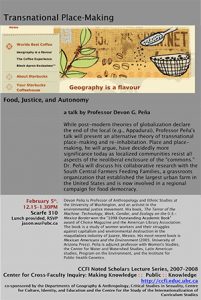
February 5, 2008
12:15 p.m. – 1:30 p.m. | Neville Scarfe Building, Room 310
Professor Devon G. Peña, University of Washington
Principally organized by the Centre for Cross-Faculty Inquiry in Education as part of the CCFI Noted Scholars Lecture Series. Co-sponsored by the Department of English, Critical Studies in Sexuality, Centre for Culture, Identity, and Education and the Centre for the Study of the Internationalization of Curriculum Studies. Poster design adapted from original by Donal O Donoghue.
Abstract: While post-modern theories of globalization declare the end of the local (e.g., Appadurai), Professor Peña’s talk will present an alternative theory of transnational place-making and re-inhabitation. Place and place-making, he will argue, have decidedly more significance today as localized communities resist all aspects of the neoliberal enclosure of the “commons.” Dr. Peña will discuss his collaborative research with the South Central Farmers Feeding Families, a grassroots organization that established the largest urban farm in the United States and is now involved in a regional campaign for food democracy.
Bio: Devon Peña is Professor of Anthropology and Ethnic Studies at the University of Washington, and an activist in the environmental justice movement. His book, The Terror of the Machine: Technology, Work, Gender, and Ecology on the U.S.-Mexico Border won the “1998 Outstanding Academic Book” award of Choice Magazine and the American Library Association. The book is a study of women workers and their struggles against capitalism and environmental destruction in the maquiladora industry of Juarez, Mexico. His most recent book is Mexican Americans and the Environment (2005, University of Arizona Press). Peña is adjunct professor with Women’s Studies, the Center for Water and Watershed Studies, Latin American studies, Program on the Environment, and the Institute for Public Health Genetics.